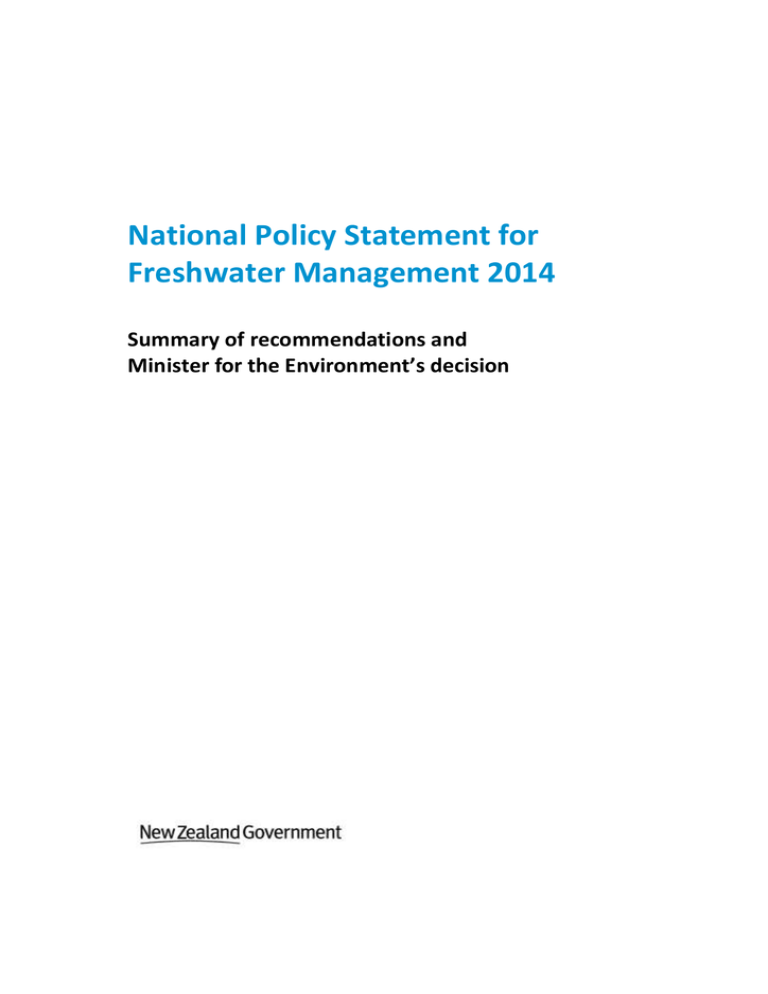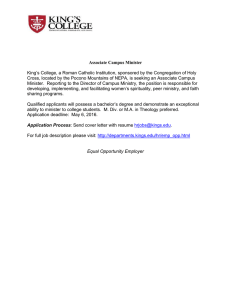National Policy Statement for Freshwater Management 2014 Summary of recommendations and
advertisement

National Policy Statement for Freshwater Management 2014 Summary of recommendations and Minister for the Environment’s decision This document may be cited as: Ministry for the Environment. 2014. National Policy Statement for Freshwater Management 2014: Summary of recommendations and Minister for the Environment’s decision. Wellington: Ministry for the Environment. Published in July 2014 by the Ministry for the Environment Manatū Mō Te Taiao PO Box 10362, Wellington 6143, New Zealand ISBN: 978-0-478-41251-2 Publication number: ME 1158 © Crown copyright New Zealand 2014 This document is available on the Ministry for the Environment’s website: www.mfe.govt.nz Contents Introduction Summary of recommendations and Minister’s decision Preamble Te Mana o te Wai Objective A1 National Objectives Framework Exceptions to national bottom lines Freshwater accounting Progressive implementation Values (Appendix 1) Attributes (Appendix 2) 4 5 6 6 7 7 7 9 9 10 12 3 Introduction The Government’s intention to amend the National Policy Statement for Freshwater Management 2011 (NPS-FM 2011) was announced with the release of Proposed amendments to the National Policy Statement for Freshwater Management 2011: A discussion document in November 2013. The Minister for the Environment (the Minister) decided not to appoint a Board of Inquiry and instead established, and used, a process under section 46A(1)(b) of the Resource Management Act 1991. The process was administered by the Ministry for the Environment. The proposed amendments were publically notified on 7 November 2013. Public meetings and hui were held across New Zealand and submissions received. The Report and recommendations on the proposed amendments to the National Policy Statement for Freshwater Management and public submissions (the Report) was provided to the Minister in April 2014. The Minister, after considering the Report, made changes to the proposed statement and recommended the resulting National Policy Statement for Freshwater Management 2014 (NPS-FM 2014) to the Governor General, who approved it on 30 June 2014. Section 52(3)(c) of the Resource Management Act 1991 requires the Minister, as soon as practicable after a National Policy Statement has been approved, to provide every person who made a submission on the statement with a summary of the recommendations and a summary of the Minister’s decision on the recommendations (including reasons for not adopting any recommendations). This document, prepared by the Ministry for the Environment on behalf of the Minister, provides that summary. 4 NPS Freshwater Management – Summary of recommendations and Minister for the Environment’s decision Summary of recommendations and Minister’s decision The Report to the Minister recommended a number of substantive changes to the amended NPS-FM 2011 as consulted on. Some of the recommendations presented options for the Minister to consider. The Minister has considered the Report, made decisions on the recommendations, made changes to the proposed NPS-FM and has recommended the final NPS-FM 2014 to the Governor-General. The Minister agreed to all of the recommendations. At times the Minister made changes to the proposed NPS-FM that went further than the recommendations in the Report. Amendments to the recommended policies were substantial in some instances (eg, changes to policies related to exceptions to national bottom lines) and minor in others (eg, small changes to wording to improve workability in practice). The recommendations of the report and the Minister’s decisions are summarised in the following tables which use the consultation version of the amended NPS-FM 2011 as the starting point. NPS Freshwater Management – Summary of recommendations and Minister for the Environment’s decision 5 Preamble Recommendation Summary of, and key reasons for, Minister’s decision Amend the proposed Preamble to reflect the final amendments to the NPS-FM. The Minister agreed to amend the Preamble to reflect the final amendments to the NPSFM. The Minister agreed to reduce the Preamble discussion of Te Mana o te Wai given that a new stand-alone part on the national significance of freshwater and Te Mana o te Wai would be progressed. Te Mana o te Wai Recommendation Summary of, and key reasons for, Minister’s decision EITHER The Minister agreed to a new, stand-alone part on the national significance of freshwater and Te Mana o te Wai. Describe Te Mana o te Wai in the Preamble as proposed OR Add an overarching purpose, statement, objective, or korowai to the NPS-FM to provide a language for tāngata whenua and communities to express their collective values using Te Mana o Te Wai or any other appropriate expression. Amend Appendix 1 to show that all values can contribute to the overarching statement. 6 Submissions highlighted a wide range of opinions regarding how tāngata whenua values are best expressed in the NPS-FM 2014. Different values are important to different groups and values are expressed in a range of different ways. The need for regional variation in the expression of tāngata whenua values suggested that a flexible or high level approach was needed. The Minister agreed to a statement at the start of the NPS-FM 2014 that sits above the objectives and policies. This statement recognises the national significance of fresh water and Te Mana o te Wai. The statement is inclusive of all communities and provides an expression of collective values for both tāngata whenua and the broader community. The aggregation of community and tāngata whenua values and the ability of fresh water to provide for them over time recognises the national significance of fresh water and Te Mana o te Wai. NPS Freshwater Management – Summary of recommendations and Minister for the Environment’s decision Objective A1 Recommendation Summary of, and key reasons for, Minister’s decision Amend proposed Objective A1(b) to safeguard the health of people and communities, at a minimum, as affected by their secondary contact with fresh water. The Minister agreed to amend Objective A1(b) to clarify that human health for secondary contact is the minimum that must be safeguarded, while in many cases councils and communities will choose to set objectives and limits for activities like swimming that involve immersion. National Objectives Framework Recommendation Summary of, and key reasons for, Minister’s decision Amend proposed Policy CA1 to require regional councils to set freshwater management units and ensure that freshwater bodies are included in water management units. The Minister agreed to the process in Part CA of the NPS-FM 2014. The Minister also agreed to a new Policy in Part CA of the NPS-FM 2014. The new Policy requires councils to set freshwater management units and include all freshwater bodies within them. This removes the potential loophole identified in submissions whereby councils could avoid setting any freshwater management units or exclude significant parts of a region from the application of the NPS-FM 2014. Exceptions to national bottom lines Recommendation Summary of, and key reasons for, Minister’s decision Add a definition of “existing water quality” to the Interpretation for Policy CA2(a) and (b) to clarify that it means the water quality at the time objectives and limits are being set. The Minister agreed to define “existing water quality” to mean the quality of the fresh water at the time the regional council commences the process of setting or reviewing freshwater objectives and limits in accordance with Policy A1, Policy B1, and Policies CA1-CA4 of the NPS-FM 2014. NPS Freshwater Management – Summary of recommendations and Minister for the Environment’s decision 7 EITHER Add a definition of ‘historical activities’ to the Interpretation for Policy CA2(b) to clarify how exceptions for historical activities are to be applied OR Delete proposed Policy CA2(b) noting that if necessary, the NPS-FM can be amended again to provide an exception for any unanticipated situations by listing them in an appendix. The Minister agreed to delete the grounds for exceptions based on historical activities. The intention was that these exceptions only apply where historic activities were not ongoing and had resulted in effects that could not reasonably be remediated. Submissions did not identify any situations where this exception might appropriately apply. The decision may be revisited in future if situations arise which warrant this type of exception. The Minister decided to further amend the Policy for exceptions relating to the effects of significant existing infrastructure. The Policy states that every regional council must ensure freshwater objectives for the compulsory values are set at or above the national bottom lines for all freshwater management units, unless the existing freshwater quality of the freshwater management unit is already below the national bottom line and the regional council considers it appropriate to set the freshwater objective below the national bottom line because any of the existing infrastructure listed in Appendix 3 contributes to the existing freshwater quality. Appendix 3 will list infrastructure rather than freshwater management units (which cannot be listed nationally as they are yet to be established by regional councils). The new wording decided by the Minister clarifies that the regional council has a discretion to decide when an exception will apply. Amendments to Appendix 3 to list existing infrastructue will follow a further process of public consultation. There were no recommendations in relation to exceptions for naturally occuring processes. However, the Minister decided to add a definition for “naturally occurring processes” to the NPS-FM 2014. Naturally occurring processes are those processes that could have occurred in New Zealand prior to the arrival of humans. This definition precludes the effects of introduced species. For example, the effects of introduced water fowl, gorse, or domesticated animals would not trigger eligibility for an exception. 8 NPS Freshwater Management – Summary of recommendations and Minister for the Environment’s decision Progress consultation on Policy CA2(c) and Appendix 3 as a priority. The process to amend Appendix 3 will commence shortly through targeted engagement, followed by public consultation later in the year. Freshwater accounting Recommendation Summary of, and key reasons for, Minister’s decision Amend the title of proposed Part CC to “Accounting for freshwater takes and contaminants” The Minister agreed to amend the title of Part CC as recommended. Amend proposed Policy CC2 to clarify that accounting information must be available for objective and limit setting. The Minister agreed to amend Policy CC2 to clarify that accounting information must be made available publically and regularly both to inform objective and limit setting and to provide information to new or potential resource users in each freshwater management unit. It will be up to councils to interpret “regularly available”. There was no recommendation on the definition of “freshwater quality accounting system”. However, the Minister decided to add to the definition so that an accounting system must also include information about the amount of contaminants attributable to each source. This information will inform the methods (including rules) in freshwater plans that regional councils choose in order to achieve targets and objectives over time. Progressive implementation Recommendation Summary of, and key reasons for, Minister’s decision Amend proposed Policy E1 so that all regional councils may adopt staged implementation programmes within 18 months of any amendments to the NPS-FM. The Minister agreed that all regional councils be allowed to adopt staged implementation programmes by 31 December 2015 (approximately 18 months from the date of amendments). NPS Freshwater Management – Summary of recommendations and Minister for the Environment’s decision 9 EITHER Proceed with the proposed deadline for implementation of the NPS-FM by 2030 OR Amend Policy E1 to reduce the proposed deadline for implementation to 2025, while allowing a 2030 deadline in limited circumstances. The Minister also agreed to amend Policy E1 to reduce the proposed deadline for implementation to 2025, while allowing a 2030 deadline where the shorter timeframe would be impracticable or result in lower quality planning. Values (Appendix 1) Recommendation Summary of, and key reasons for, Minister’s decision Amend all the proposed values in Appendix 1 to: The Minister agreed to amend the value descriptions and headings in Appendix 1 of the NPS-FM as recommended. consistently describe both the quality and quantity aspects of each value rationalise the structure and headings of Appendix 1 clarify the value descriptions. Ecosystem health Ecosystem health Amend the proposed compulsory national value of ecosystem health to: The Minister agreed to amend the ecosystem health value in Appendix 1 of the NPS-FM 2014 as recommended. describe healthy ecosystems first before describing the matters to take into account. add additional matters to the value description, including macroinvertebrates. Human health Human health EITHER The Minister agreed to a compulsory national value of human health for recreation in the NPS-FM 2014. The human health for recreation value combines the proposed compulsory value of human health (secondary contact recreation) and the additional value of contact recreation to cover a range of recreational activities on freshwater. Proceed with the proposed compulsory national value of human health (secondary contact recreation). OR Develop a compulsory national value of human health for recreation that combines the proposed compulsory value of human health (secondary contact recreation) and the additional value of contact recreation. 10 NPS Freshwater Management – Summary of recommendations and Minister for the Environment’s decision Food security Food security Merge or revise the proposed additional national value of food security with the additional national values for irrigation and animal drinking water to avoid duplication. The Minister agreed to merge the proposed additional national value of food security with the additional national values for irrigation to avoid duplication. The word “food security” in the heading of the value description was replaced with the words “food production” to ensure that prioritisation of national values is not implied. The Minister agreed to retain a separate animal drinking water value but to group it with the irrigation and food production value. Water supply Water supply Amend the proposed additional national value of water supply to ensure it is not read narrowly as only relating to drinking water. The Minister agreed to amend the proposed additional national value of water supply as recommended. Potable water supply is valued for uses other than drinking, for example cleaning. Fire-fighting Fire-fighting Delete the proposed additional national value of fire-fighting because section 14 of the RMA already explicitly provides for the use of water for firefighting. The Minister agreed to delete the proposed additional national value of fire-fighting as recommended. Wai Tapu Wai Tapu Amend the additional national value of wai tapu to remove the reference to site accessibility (physically and legally). The Minister agreed to amend the additional national value of wai tapu as recommended). NPS Freshwater Management – Summary of recommendations and Minister for the Environment’s decision 11 Attributes (Appendix 2) Recommendation Summary of, and key reasons for, Minister’s decision Attributes for Ecosystem Health Attributes for Ecosystem Health Amend the proposed Chlorophyll a attribute for lakes to name it Phytoplankton. The Minister agreed to amend the name of the Chlorophyll a attribute as recommended. Amend the nitrate toxicity attribute so that it only applies to rivers. The Minister agreed to amend the nitrate toxicity attribute so that it only applies to rivers. Amend the ammonia toxicity attribute to use an annual maximum. Amend the periphyton attribute to use an annual maximum that is exceeded no more than once per year, and providing different assessment for naturally productive rivers The Minister agreed to amend the ammonia toxicity attribute to use an annual maximum as recommended. The Minister also agreed to amend the periphyton attribute to use an annual maximum that is exceeded no more than once per year, and to use a different assessment for naturally productive rivers. Attributes for Human Health and/or Contact Recreation Attributes for Human Health and/or Contact Recreation Amend the proposed cyanobacteria attribute so that it only applies to lakes and lake fed rivers and uses a statistical measure of the 80th percentile. The Minister agreed to amend the proposed cyanobacteria attribute as recommended so that it only applies to lakes and lake fed rivers and uses a statistical measure of the 80th percentile. Delete the proposed Suitability for Recreation Grade (SFRG) attribute for contact The Minister agreed to delete the proposed recreation and replace it with an E. coli Suitability for Recreation Grade (SFRG) attribute. attribute for contact recreation and replace it with an E. coli attribute. 12 NPS Freshwater Management – Summary of recommendations and Minister for the Environment’s decision EITHER Proceed with the proposed E. coli attribute for human health (secondary contact recreation) but amend the narrative attribute description state to align with the 25 per cent water ingestion rate used OR Amend the proposed E. coli attribute to use a sampling metric of the 80th percentile and a water ingestion rate of 10 per cent, which lowers the proposed national bottom line from 1,000 to 1,500 E. coli per 100 ml OR Combine the proposed E. coli attribute for human health (secondary contact recreation) with the recommended E. coli attribute for contact recreation, and retain a bottom line relating to secondary contact. The Minister agreed to combine the proposed E. coli attribute for human health (secondary contact recreation) with the recommended E. coli attribute for contact recreation, and retain a bottom line relating to secondary contact. The Minister also agreed to amend the narrative attribute description to align with the 25 per cent ingestion rate used in the model. The new description acknowledges that the national bottom line provides for activities that may involve occassional immersion and some ingestion of water. The Minister did not agree to use an 80th percentile and 10 per cent ingestion rate because the national bottom line would lower from 1,000 to 1,500 E. coli per 100 ml. NPS Freshwater Management – Summary of recommendations and Minister for the Environment’s decision 13
![sgro let 2016[2]](http://s2.studylib.net/store/data/010229843_1-e0a76474d024170c55ba57ae7a7037be-300x300.png)



